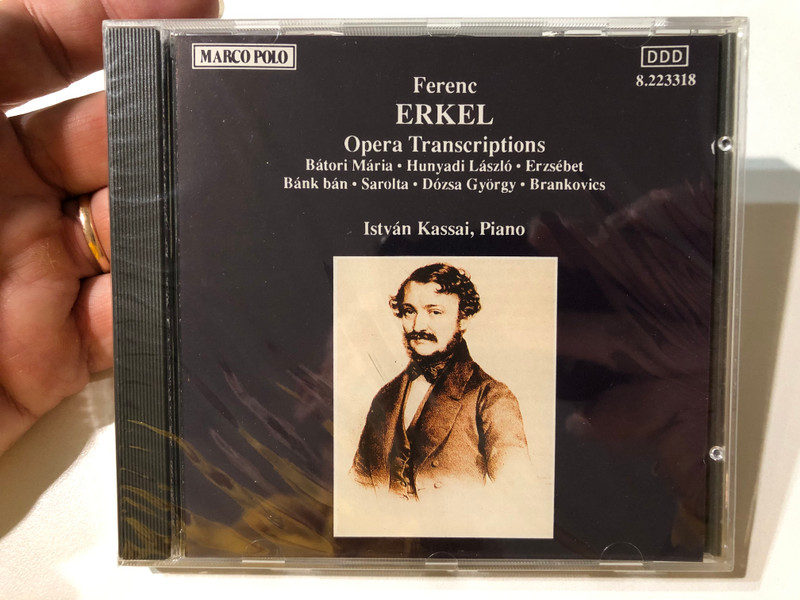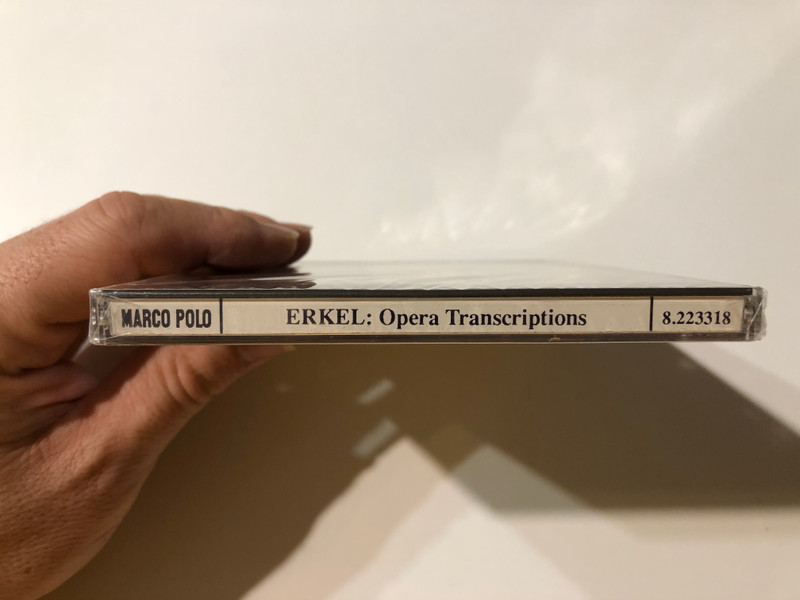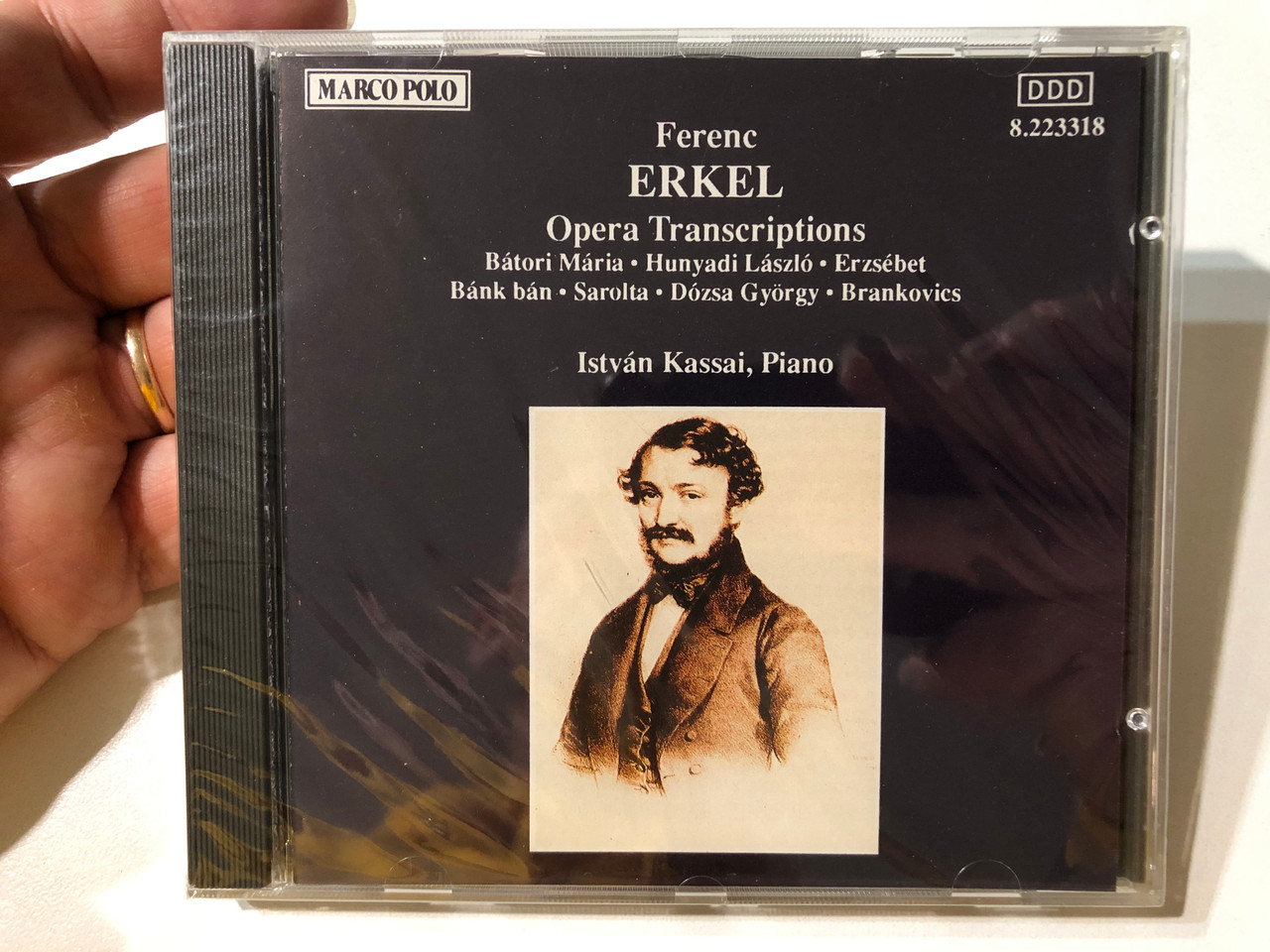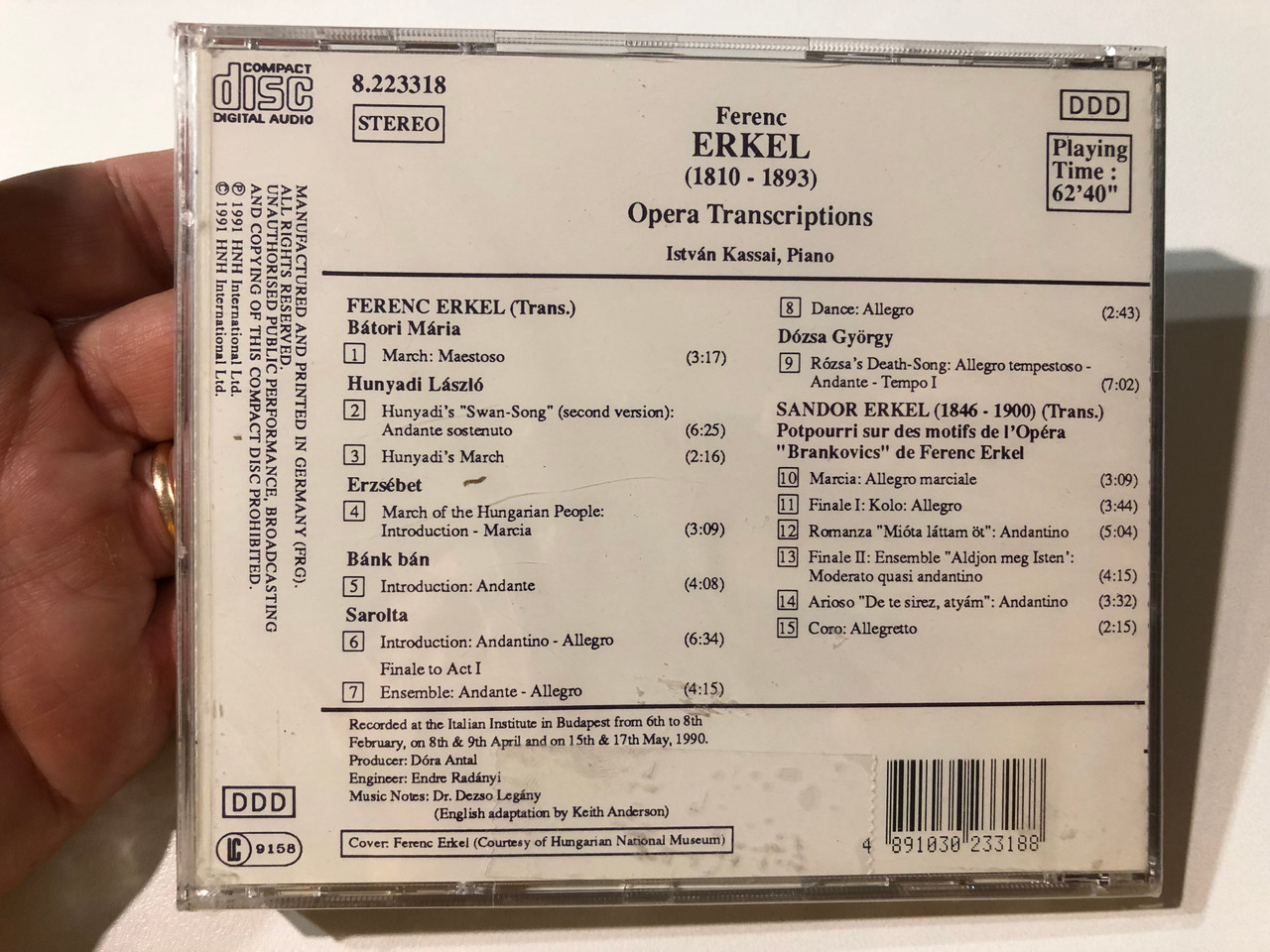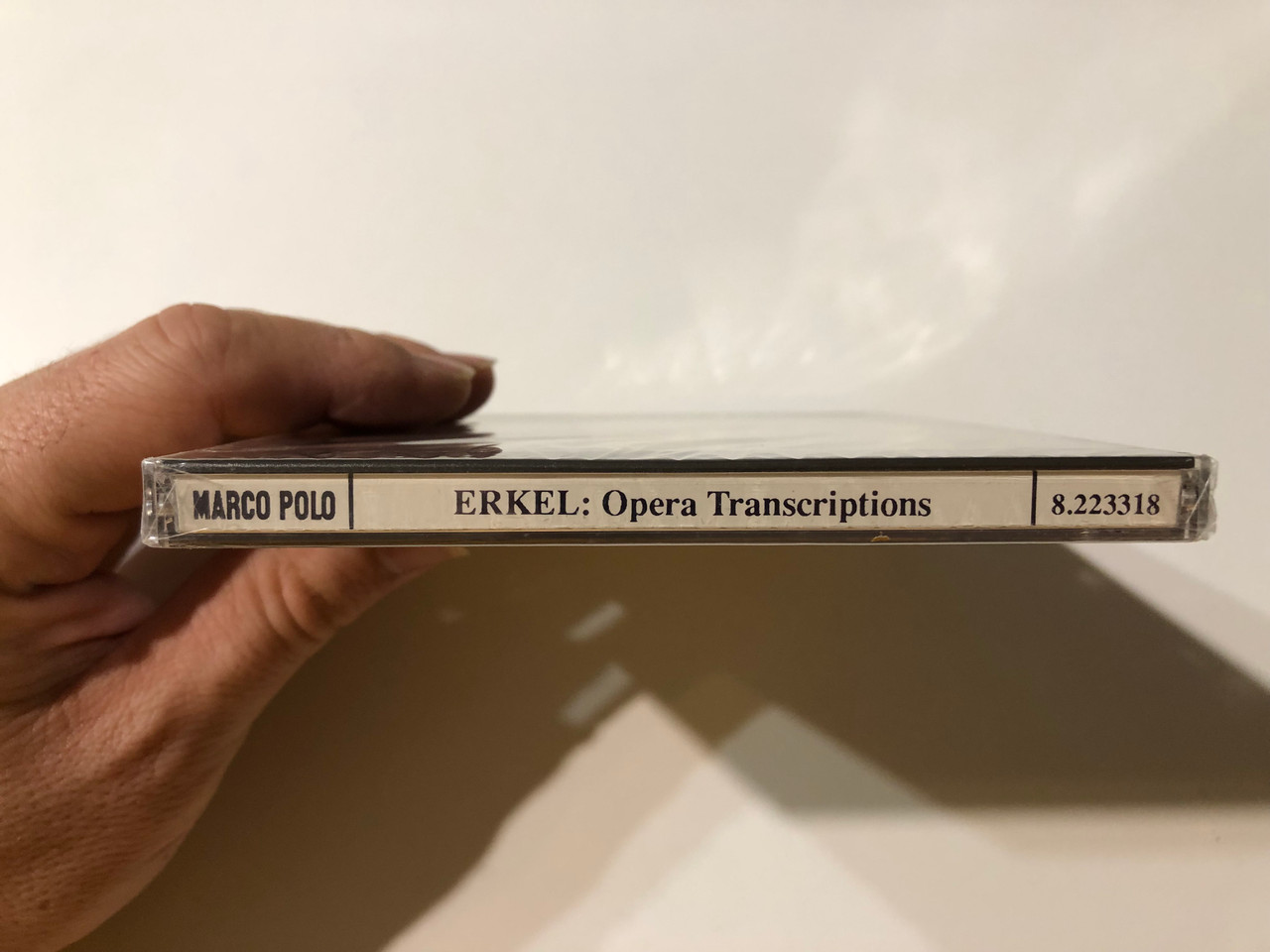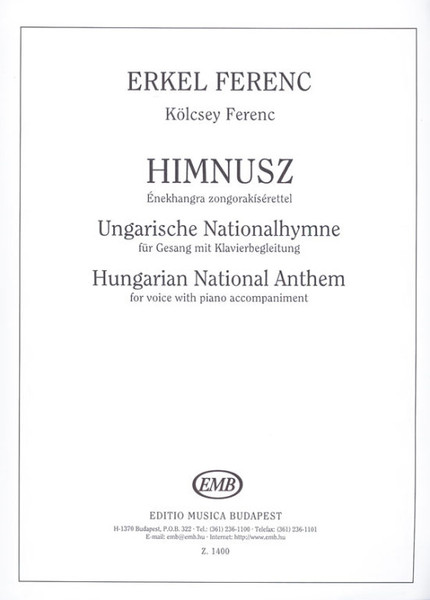Description
Ferenc Erkel: Opera Transcriptions | Piano Works performed by István Kassai - Music CD
Product Information
- UPC: 4891030233188
- Product Code: Marco Polo 8.223318
- Product Type: Classical Music CD
- Genre: Classical Piano / Opera Transcriptions
- Format: CD
- Label: Marco Polo / HNH International Ltd.
- Recording Type: DDD (Digital)
- Playing Time: 62:40
- Release Year: 1991
- Recording Location: Italian Institute in Budapest
- Recording Dates: February 6-8, April 8-9, and May 15-17, 1990
Overview
This Marco Polo release presents rare and valuable piano transcriptions of operatic works by Ferenc Erkel (1810-1893), the founder of Hungarian national opera. Performed with technical brilliance and stylistic understanding by pianist István Kassai, these transcriptions offer listeners a unique perspective on Erkel's operatic output, featuring excerpts from seven operas including his masterpieces "Hunyadi László" and "Bánk bán." The collection also includes a substantial potpourri on themes from "Brankovics" arranged by the composer's son, Sándor Erkel. These piano versions capture the dramatic essence and Hungarian national character of Erkel's original orchestral compositions, presenting them in intimate keyboard settings that highlight both their melodic beauty and structural innovation. This recording serves as an important document of 19th-century Hungarian musical nationalism and the European tradition of operatic piano transcriptions.
Product Features
- Complete piano transcriptions of excerpts from seven Erkel operas
- Performed by Hungarian pianist István Kassai
- High-quality digital recording (DDD)
- Comprehensive liner notes by Dr. Dezső Legány (English adaptation by Keith Anderson)
- Historical cover image of Ferenc Erkel courtesy of Hungarian National Museum
- Includes rare transcriptions from less frequently performed Erkel operas
Interesting Facts
Father of Hungarian National Opera
Ferenc Erkel is considered the founding father of Hungarian national opera. Born in 1810 in what is now Gyula, Hungary, he successfully combined Western European operatic structures with elements of Hungarian folk music and verbunkos (a Hungarian recruitment dance style). His works emerged during a period of rising Hungarian nationalism and helped establish a distinctively Hungarian musical identity at a time when the country sought cultural independence from Habsburg rule.
Historical Significance
Many of Erkel's operas dealt with significant events from Hungarian history, reinforcing national identity through music. "Hunyadi László," represented on this recording by three pieces, tells the dramatic story of László Hunyadi, a 15th-century Hungarian military leader executed after political intrigue. "Bánk bán," perhaps Erkel's most famous opera, concerns a 13th-century nobleman who led a conspiracy against foreign influence in the Hungarian court. These works became not just artistic achievements but cultural symbols of Hungarian identity.
Transcription Tradition
The practice of creating piano transcriptions of operatic works was extremely popular in 19th-century Europe, serving both as entertainment for amateur pianists and as a means to disseminate operatic melodies before the age of recordings. These particular transcriptions by Erkel himself and his son Sándor allowed Hungarian audiences to experience these national works in their homes, further solidifying their cultural impact. The transcriptions range from straightforward arrangements to more elaborate fantasies that showcase pianistic virtuosity.
Musical Dynasty
The inclusion of a transcription by Sándor Erkel (1846-1900) reflects the musical dynasty established by Ferenc Erkel. Four of his sons became musicians, with Sándor working as a conductor and composer. The potpourri on themes from "Brankovics" demonstrates how the younger generation continued to promote and develop their father's musical legacy, adapting it to changing tastes while preserving its essential Hungarian character.
Track Listing
-
Bátori Mária: March: Maestoso (3:17)
-
Hunyadi László:
- Hunyadi's "Swan-Song" (second version): Andante sostenuto (6:25)
- Hunyadi's March (2:16)
-
Erzsébet:
- March of the Hungarian People: Introduction - Marcia (3:09)
-
Bánk bán:
- Introduction: Andante (4:15)
-
Sarolta:
- Introduction: Andantino - Allegro (6:34)
- Finale to Act I - Ensemble: Andante - Allegro (4:15)
- Dance: Allegro (2:43)
-
Dózsa György:
- Rózsa's Death-Song: Allegro tempestoso - Andante - Tempo I (7:02)
-
Brankovics (Transcribed by Sándor Erkel):
- Potpourri sur des motifs de l'Opéra "Brankovics" de Ferenc Erkel:
- Marcia: Allegro marciale (3:09)
- Finale I: Kolo: Allegro (3:44)
- Romanza "Mióta láttam öt": Andantino (5:04)
- Finale II: Ensemble "Aldjon meg Isten": Moderato quasi andantino (4:08)
- Arioso "De te sirez, atyám": Andantino (3:32)
- Coro: Allegretto (2:15)
- Potpourri sur des motifs de l'Opéra "Brankovics" de Ferenc Erkel:
Production Credits
- Pianist: István Kassai
- Producer: Dóra Antal
- Engineer: Endre Radányi
- Music Notes: Dr. Dezső Legány (English adaptation by Keith Anderson)
- Cover: Ferenc Erkel (Courtesy of Hungarian National Museum)
Publishers
© 1991 HNH International Ltd. ℗ 1991 HNH International Ltd. Marco Polo is a division of Naxos.
We value your feedback! Share your experience with this product to help others make informed decisions. Your review is important to us!
Hashtags
#FerencErkel #HungarianOpera #PianoTranscriptions #IstvánKassai #ClassicalPiano #HungarianMusic #BánkBán #HunyadiLászló #MarcoPolo #OperaticPiano #19thCenturyMusic #HungarianComposers

